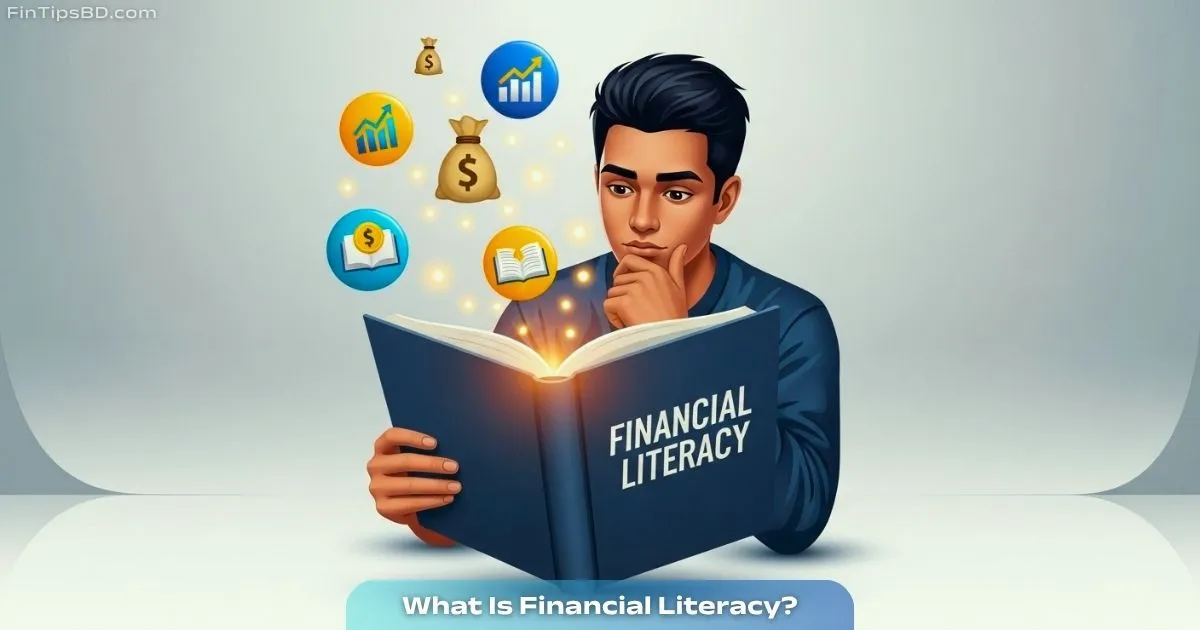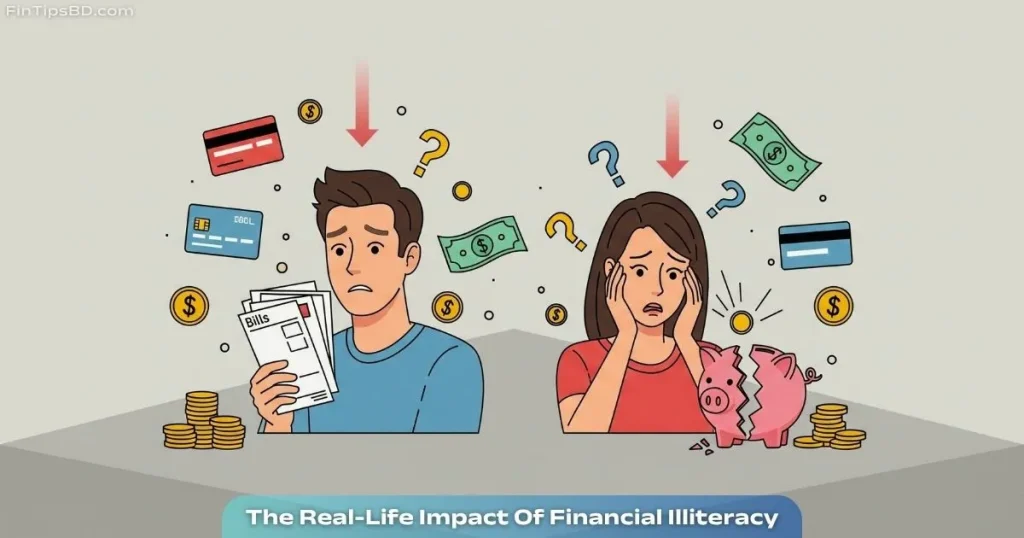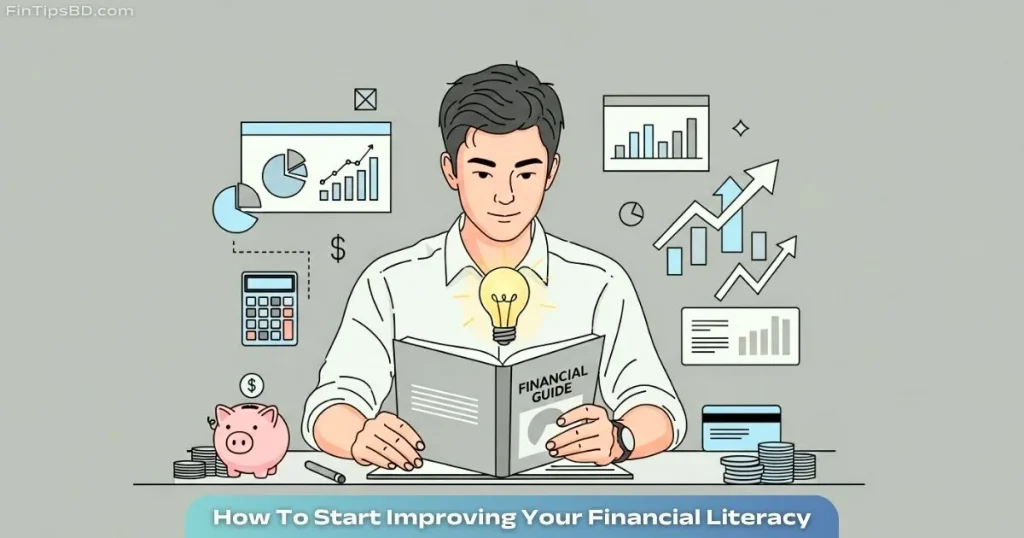What Is Financial Literacy? The Shocking Truth Schools Never Taught You!

In today’s money-driven world, where credit cards and spending choices shape our lives, there’s one essential life skill that can completely transform your future—financial literacy. But what is financial literacy, and why do so many people reach adulthood without learning even the basics of handling money?
You likely spent years in school solving math problems or memorizing dates from history. But were you ever shown how credit card interest actually works? Or how to build a monthly budget? Or even what your credit score really means?
This article takes a close look at the real reasons behind the lack of financial education, why financial literacy is more important than ever, and how you can start taking control of your money—starting today.
Table Of Contents
What Is Financial Literacy and Why It Matters
Financial literacy is simply the ability to understand and manage your money wisely. It includes knowing how to earn, save, borrow, invest, and protect your finances in a smart and informed way.
At its heart, financial literacy is all about one thing: having control. It puts you in charge of your money instead of letting your money control your life.
Someone who is financially literate can:
- Track their income and spending easily
- Make and follow a realistic personal budget
- Understand how debt, interest, and loans work
- Know how to build and keep a strong credit score
- Make smart decisions when investing
- Plan ahead for emergencies, retirement, and long-term goals
Without basic financial knowledge, even people who make good money can fall into debt, make poor decisions, and live with constant stress. It’s not just about paying your bills—it’s about creating stability, recognizing good opportunities, and steering clear of money traps that can cause serious financial trouble.
Why Schools Never Taught You This
One of the most common and frustrating questions many adults ask is: Why didn’t anyone teach me this stuff earlier?
There are a few uncomfortable but real reasons why most schools leave out personal finance lessons:
1. It’s Not Considered a Top Priority
Most schools concentrate on subjects that are tested—like math, reading, and science. Real-world skills such as budgeting, saving, or understanding credit usually don’t make it into the classroom. Academic topics are often seen as more important for college, while practical money skills are pushed aside.
2. Many Teachers Lack Financial Knowledge Themselves
A lot of teachers were never taught personal finance either, during school or in their training. If they’re not confident about the topic, they can’t teach it well. This leads to a cycle where financial ignorance keeps getting passed down from one generation to the next.
3. Talking About Money Is Still Taboo
In many families and cultures, discussing money is seen as rude or too private. Because of this, many kids grow up without any financial lessons at home or at school. This silence around money topics makes it harder for people to ask questions or get the help they need.
4. Some Believe It’s Done on Purpose
Some critics argue that keeping people financially uneducated makes them easier to influence—through ads, credit schemes, and bad financial advice. While this might sound harsh, it’s true that a lack of financial education has created a society where debt is normal and saving is rare. A population that doesn’t understand money is more likely to fall for scams and get stuck in harmful financial situations.
The Real-Life Impact of Financial Illiteracy

Not knowing the basics of money management can lead to serious problems. It’s more than just not having a budget—it can mean long-term financial trouble, stress, and fewer options in life.
People who lack basic money skills often:
- Live paycheck to paycheck: Without understanding how to balance income and expenses, many struggle just to get by, no matter how much they earn.
- Struggle with debt and don’t know how to pay it off: High-interest credit cards or big loan payments can quickly get out of hand if someone doesn’t understand how interest works or how to make a plan to repay.
- Have low credit scores that block job or housing chances: A poor credit rating can stop someone from renting a place, getting a car loan, or even landing certain jobs, which can seriously affect their quality of life quality.
- Fall for scams or bad deals: Without the knowledge to spot trustworthy offers, people become easy targets for fraud or expensive financial traps.
- Fail to save for emergencies or retirement: Without planning for unexpected events or future needs, individuals can face harsh financial shocks or an uncertain retirement.
- Experience ongoing stress about money: Constant financial worries can hurt mental and physical health, strain relationships, and lower overall happiness.
Financial illiteracy doesn’t just harm individuals—it affects families, damages relationships, and puts pressure on whole communities and economies. When many people struggle financially, it can increase dependence on social help and weaken the economy as a whole.
Key Components of Financial Literacy
Let’s break down the most important money skills everyone should learn:
1. Budgeting Basics
Making a budget is the foundation of good money management. It shows you where your money is going and where you can cut back. A simple rule like 50/30/20 (50% needs, 30% wants, 20% savings) can be a good starting point. Budgeting isn’t about feeling restricted; it’s about understanding your spending and making smart choices.
2. Saving and Emergency Funds
Without savings, emergencies can become disasters. Financially smart people build an emergency fund to cover at least three to six months of costs. Even saving a little bit regularly adds up over time because of consistent effort and interest. This fund acts as a safety net for tough times like losing a job or facing medical bills.
3. Understanding Credit and Debt
Credit cards, loans, and financing can be useful tools or dangerous traps. Being financially literate means knowing how interest rates work, understanding repayment terms, and using credit wisely. This also means knowing the difference between good debt (like a mortgage that builds equity) and bad debt (like expensive consumer credit).
4. What Is a Credit Score and Why It Matters
Your credit score can decide if you get a loan, rent a home, or even get certain jobs. Knowing how to improve your score—by paying bills on time, keeping credit use low, and checking your credit report regularly—can open many financial doors and save you a lot of interest.
5. Smart Investing
Investing isn’t only for the rich. Even small, regular deposits into retirement accounts or mutual funds can grow a lot over time thanks to compound interest. Financial literacy means understanding your options, risks, and how to start investing without falling for hype or scams. It’s about building long-term wealth in a careful way, not just relying on your paycheck.
6. Retirement Planning
Many wait too long to start planning for retirement. Beginning early—through employer plans like 401(k)s, IRAs, or other investments—is key to long-term financial security. The earlier you start, the more time your money has to grow, which can make a big difference in how comfortable your later years are.
How to Start Improving Your Financial Literacy

If you’ve never learned this before, don’t worry—you’re not alone, and it’s never too late to start.
Here are some simple ways to begin:
- Read Personal Finance Books or Blogs: Look for easy-to-understand guides. Books like The Total Money Makeover by Dave Ramsey or Your Money or Your Life by Vicki Robin and Joe Dominguez can give you a solid foundation. There are also many trustworthy blogs that offer free, practical tips on all kinds of money topics.
- Use Budgeting Tools or Apps: Apps like Mint, YNAB (You Need A Budget), or PocketGuard help you track your spending and stay organized. These tools give you a clear picture of where your money goes, making it easier to find ways to save.
- Watch YouTube or Listen to Finance Podcasts: There are plenty of free resources that explain tricky financial ideas in simple terms. Many channels and podcasts focus on personal finance and provide helpful, easy lessons.
- Track Your Income and Expenses: Whether you use a notebook, spreadsheet, or an app, regularly monitoring your money coming in and going out is the first and most important step. Being aware is key to making better financial choices.
- Talk Openly About Money: Whether it’s with your partner, a close friend, or a financial advisor, sharing your money thoughts and worries can lead to healthier habits and fresh ideas. Breaking the silence about money can be very freeing.
- Get Professional Help (When You’re Ready): Once you understand the basics, think about working with a financial expert. They can help you make a plan tailored to your goals, especially for bigger steps like investing or planning for retirement.
Final Words: Take Control Before It’s Too Late
Knowing What Is Financial Literacy Could Be The Most Important step you take for your future. The truth is, most people don’t struggle because they don’t earn enough—they struggle because they don’t know how to handle the money they have.
You don’t need to be a finance expert to take charge. All you need is the willingness to learn, make smarter choices, and stay consistent. Start small. Stay curious. And remember, financial freedom isn’t a dream—it’s a skill you can develop.
Keywords: financial education, personal finance skills, how to manage money, credit score basics, debt management, budgeting for beginners, saving money tips, investing basics, emergency fund planning, financial responsibility, financial independence, understanding interest rates
